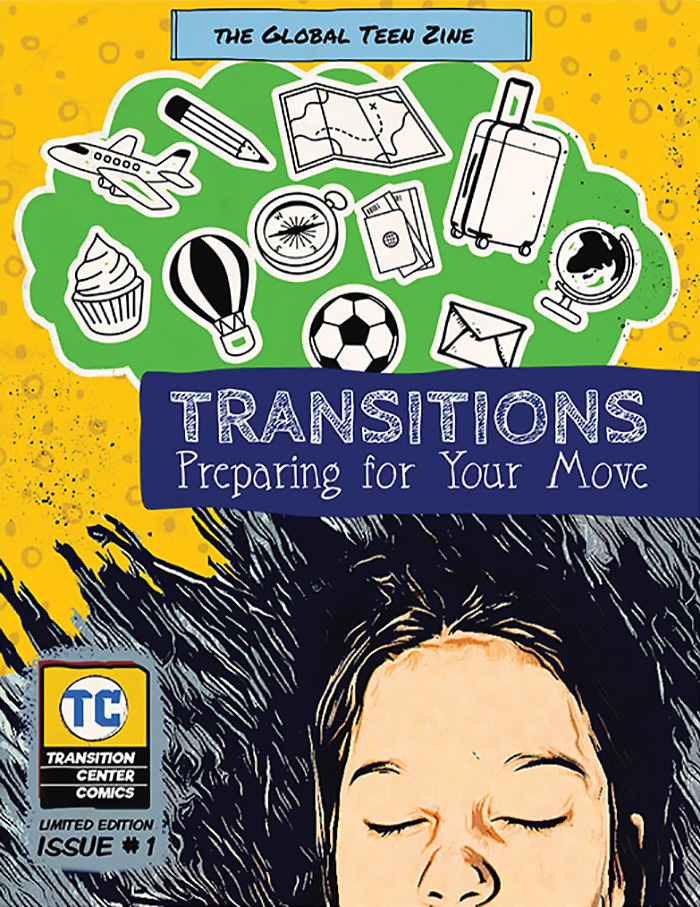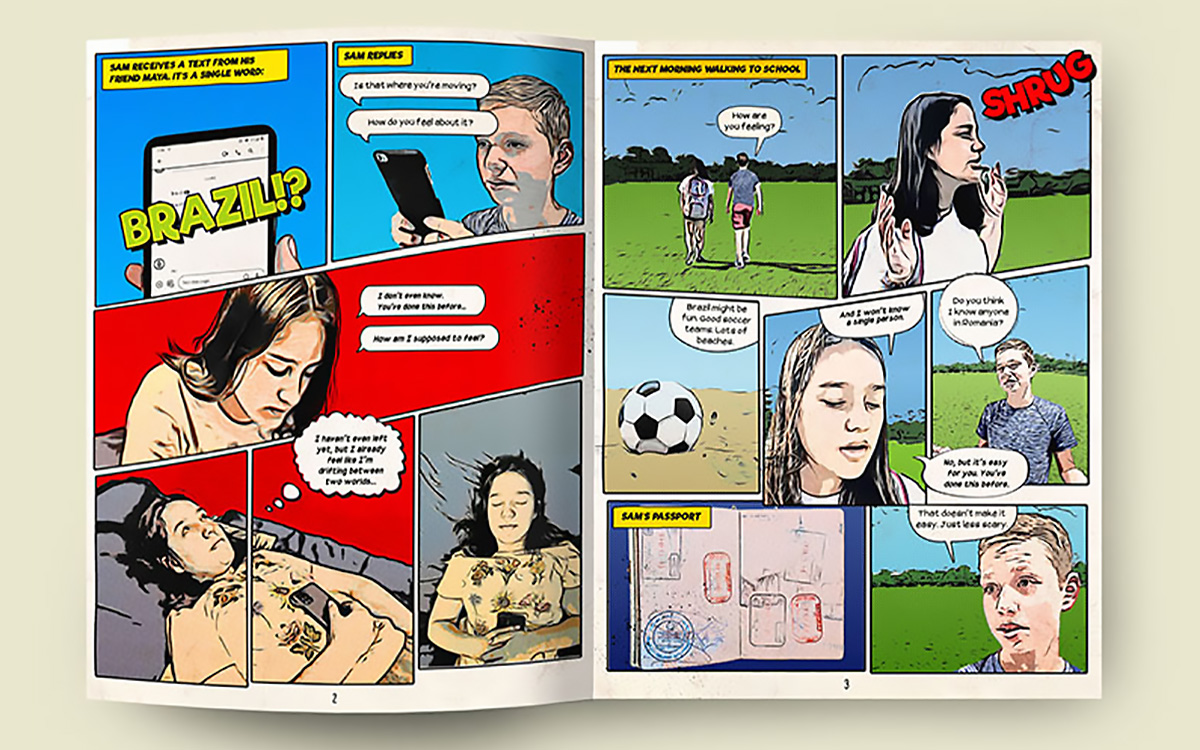Supporting Families and Third-Culture Kids Through FS Transitions
There is no one-size-fits-all in a Foreign Service transition.
BY WYOKEMIA JOYNER AND SARAH GENTON

The first issue of the Transition Center’s new five-part “zine” for FS tweens.
U.S. Department of State
Navigating the Foreign Service journey can be complex. Adjusting to a new home, a new city and a new country all at once brings with it many exciting new discoveries, along with unexpected challenges. For adults, arriving at post and adjusting to a new country often includes figuring out the lay of the land, both personally and professionally.
Whether that is meeting new host country government counterparts and other officials, determining who the key points of contact are to get shipments sorted, or navigating what is and is not available in local grocery stores—the adjustment to life at post includes a full list of to-dos. While important and practical tasks can certainly fill up an arrival schedule, the well-being of children during a relocation is a primary concern for parents.
Transitions in life take a lot of planning, resilience and grit—and this is especially true for Foreign Service youth. While they are not showing up to post and being thrown into the latest multilateral negotiation, they are walking the halls of their new international—or French, British or local—school trying to sort out who their new “best friend forever” (BFF) will be, while also attempting to pick up a few new words in the local language to order an after-school snack on the way home, or preparing to apply to college back in the U.S. even though they feel out of touch with “life back home” because they have not lived there in years.
Every few years, each Foreign Service parent and child will undergo a major transition that results in an experience unique to them. Within the same family, one person may have what feels like the perfect transition, while another family member struggles to adjust and find their way in the new place they now call home. There is no one-size-fits-all in the Foreign Service transition story; there is no single blueprint for everyone. However, understanding the unique experience that the Foreign Service journey brings for children can be helpful in supporting them along the way.
Through the Eyes of Third-Culture Kids
As families move, paying attention to children’s comments and expressions can signal to a parent how a child is experiencing a transition. For some, the hardest part of leaving a post may be saying goodbye to friends and others that children have spent a lot of time with for the last two years or longer. One Foreign Service parent noted, “After leaving post, my 3-year-old’s first words every morning for a year were, ‘When do we get to go home?’ It was heart-wrenching.”
Helping children to say goodbye and maintain connections is important. Consider these ideas to foster memories and connections throughout transitions:
- Take photos of your child with their favorite people and use the photos to make a collage for your child’s bedroom wall or a small photo book they can carry with them.
- Make a copy for your child’s friends or nanny as a gift for your child to give before leaving, so they can remember each other in this way.
- Make note of favorite activities your child enjoyed and find a way to continue those activities at your new location.
- If your child is sad and missing someone, have them write a note or draw a picture for the person. If possible, send the letter or picture to the individual via email or mail and share the person’s reaction when they receive it with your child.
- Stay connected! Help facilitate or encourage periodic video calls, emails, letters or text messages to stay in touch.
For some third-culture kids (TCKs), comfortable home surroundings make all the difference in acclimating to a new location. One parent said, “When we moved back to the United States, I was excited to show my children our new house. The kids were oddly silent as we walked through it. Finally, my oldest said, ‘Mom, I just don’t see how this house is going to work. It doesn’t even have bookshelves or beds!’ I realized that they’d always arrived to fully furnished homes overseas.”
Transitions in life take a lot of planning, resilience and grit—and this is especially true for Foreign Service youth.
Making a house feel like home—as quickly as possible—is very helpful to third-culture kids. Bringing wall decals and familiar room decoration items can help make a new, empty house feel like home. Packing these items in hand-carried luggage may help speed up the acclimation process.
Children take their cues from parents—they learn from watching the adults in the room. Helpful strategies for modeling positivity include finding the good in each event along the way, helping children focus on that which they can control, and setting the example for dealing with challenges and difficult circumstances, like canceled flights, travel disruptions and lost items along the way.
A resilient outlook involves adapting and navigating the many challenges and unique experiences that come from living abroad and moving internationally. To assist with this, it is important to have a diverse set of tools in your toolbox that are always handy for you and your family to use throughout the many transitions of your Foreign Service journey.
The FSI Transition Center
The FSI Transition Center provides training, support and resources to assist all individuals—including parents and children—in navigating the many transitions of their Foreign Service life. “Our mission is to facilitate the transitions of all members of the U.S. foreign affairs community from all agencies into effective assignments overseas and repatriations,” says Director Ray Leki. “It doesn’t matter if our client is an ambassador going to a key post overseas or the 6-year-old son of a single parent Foreign Service member headed to a first post, or anyone in between. They all deserve our attention, our tailored consultations and resources, and our caring support.”
During his 31 years with the Transition Center, Leki has seen the ups, downs and the all-arounds of Foreign Service families, including third-culture children. From the joys of expanded families through adoption, opportunities to explore some of the most far-reached corners of the world and the ability to connect with local communities through volunteer work while at post, to the challenges of evacuations, bombings, civil unrest and global pandemics—Leki and his staff have encountered innumerable stories throughout the years. It is the real-life experiences and insights of Foreign Service professionals and their family members that continues to inform and guide TC’s resources, programs and training.

Inside the “Transitions” zine dealing with moving to a new post.
U.S. Department of State
Building Resilience
In 2016 the Transition Center established the Center of Excellence in Foreign Affairs Resilience. In fact, TC has long offered customized training and resources to support Foreign Service professionals and their families. Says Eric Cipriano, an education program specialist with CEFAR: “Third-culture kids encounter a lot of change. Changes in schools and changes in their daily interactions. This results in Foreign Service kids having unique needs and common concerns. It’s important to learn from these experiences and apply them to CEFAR programming. We want to do anything we can to help kids move forward collectively.”
One CEFAR course, “Encouraging Resilience in Your Foreign Service Child (MQ500),” is designed for foreign affairs agency employees and their family members and draws from one of the most valuable resources available—foreign affairs youth and their parents. Guided by insights gained from real-life experiences over the years, the course explores factors that affect TCKs in their transient lifestyles and offers parents strategies to assist in facilitating smooth transitions and parenting in an international, cross-cultural environment.
The Transition Center’s Foreign Affairs Life Skills Training team also offers more than 30 courses to help prepare and equip foreign affairs community members before going to post, during their time overseas and as they transition back to the U.S., including several aimed at supporting families and children.
Helping children to say goodbye and maintain connections is important.
For instance, to assist parents in understanding some of the resources and options that are available to them in navigating a child’s education, TC offers “Ask the Education Expert: Educating Your Child Overseas (K-12)” in coordination with the Office of Overseas Schools. Another useful course is “Educating Your Foreign Service Child: The Boarding School Option.” Most recently, the center has added two new courses focused on educating a child with identified needs while posted overseas. Partnering with the Bureau of Medical Services’ Child and Family Program and the Office of Overseas Schools, TC offers “Educating Your Special Needs Child in the Foreign Affairs Community” and “Navigating the Foreign Service Lifestyle with a Child with an Autism Spectrum Diagnosis.”
The Transition Center’s courses and webinars offer parents a great place to gather information, learn best practices, share common concerns, and find unique solutions to shared challenges of living and thriving in the foreign affairs community.
Bringing the Overseas Experience to Life
For years, the Transition Center’s Overseas Briefing Center has hosted the annual KidVid Contest in collaboration with the Foreign Service Youth Foundation, where young videographers submit their footage and commentary on life at their current overseas location. The collection provides a glimpse into life overseas from the perspective of TCKs and has grown to include experiences at posts in all regions of the world, while on evacuation status and during the COVID-19 pandemic. For many children, word descriptions of overseas living do not bring to life what they may see and experience at a new post. Viewing real pictures and footage gives children a realistic look and feel for what is to come.
Cultural awareness, another gift that TCKs pick up during their international experiences, proves valuable over the course of a lifetime. To further a child’s knowledge, the OBC offers young members of our community access to CultureGrams, a ProQuest product that includes a Kids CultureGrams series. When researching a country, children can learn about local customs and traditions, food, holidays, history, some common phrases and country statistics.

This interactive Transition Center resource for young children comes with a Parent Guide.
U.S. Department of State
Amid frequent relocations, Foreign Service children often miss the opportunity to process the experience in a meaningful and constructive way. To facilitate adapting to the many changes TCKs encounter, the OBC, in collaboration with CEFAR, created “The Amazing Adventures of [Me]: A Guided Journal to My International Move” with a companion Parent Guide. This interactive resource is filled with activities to encourage curiosity and discovery, quotes from real kids, and games to prompt discussion. The Parent Guide facilitates discussions between children and parents as they process and prepare for an international move.
The Overseas Briefing Center’s newest resource, also developed in collaboration with CEFAR, was designed especially for middle schoolers. This “tweens” age group often deeply feels the emotional ups and downs of change, including when it comes to their mobile lifestyle. “Transitions” is the first “zine” in a series of five based on the concept of a graphic novel but in short-magazine format. Zines tell the stories of FS kids who travel from post to post and their struggle to find their place in the world. Whether dealing with the complications of a move, figuring out a new school or finding new friends, zines cover topics that most TCKs can relate to and include age-appropriate ways to deal with common issues they may encounter.
One parent noted that “Transitions” helped prompt a discussion about a familiar thought among tweens: “I’m moving anyway, so it doesn’t matter.” The feeling that a move means forgetting about friends and not resolving issues before leaving is common among tweens. Yet keeping in touch with friends and family helps TCKs make new friends, share new discoveries and take advantage of new experiences. They can learn to celebrate the adventure of self-discovery. When supported by communication within the family, with extended family members and friends in a variety of places, a community emerges that provides a sense of belonging wherever a child may be.
With so many different types of transitions and so many to-dos, it can be challenging to keep up with it all. The Transition Center’s Foreign Service Assignment Notebook: What Do I Do Now? is a go-to resource for adults that covers important aspects of the Foreign Service experience. The 32-chapter publication answers many of the questions frequently posed by families who take children abroad. Whatever your question, you may find the answer in this resource, so it is helpful to have on hand.
Reach out to FSITransitionCenter@state.gov to learn more about these courses and resources, as well as other TC programs. TC welcomes feedback from foreign affairs families and encourages suggestions for future programming and services.
Read More...
- “Mental Health Support for Foreign Service Children: Parents Weigh In,” The Foreign Service Journal, June 2016
- “What about Our Kids?,” by Kim Deblauw, The Foreign Service Journal, January 2016
- “Raising Foreign Service Kids,” by John Naland, The Foreign Service Journal, November 2015





